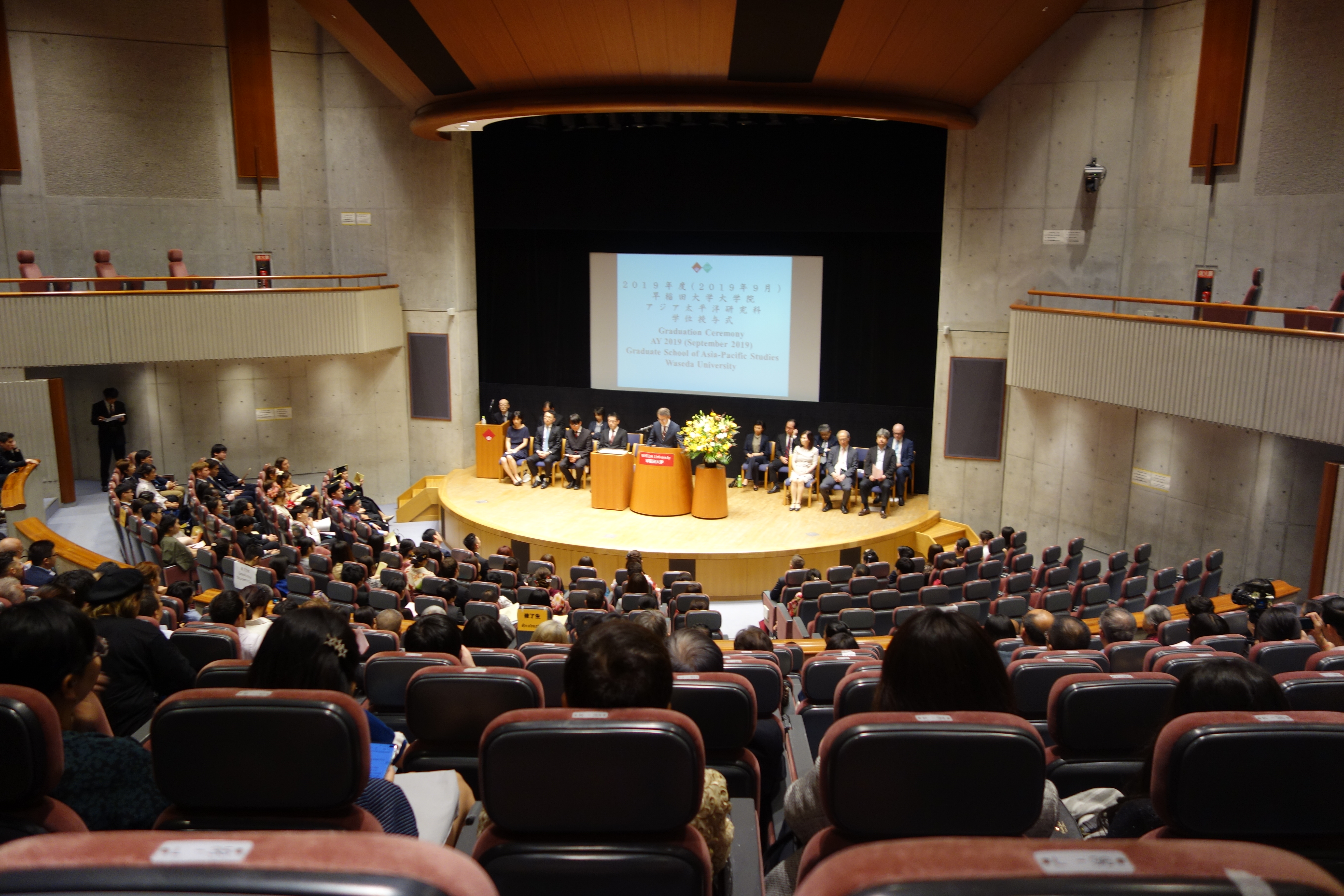- News
- GSAPS Graduation Ceremony (September 2019): Dean’s Address
GSAPS Graduation Ceremony (September 2019): Dean’s Address

- Posted
- Tue, 17 Sep 2019
On behalf of Waseda University, Graduate School of Asia-Pacific Studies, I offer my heartfelt congratulations to all of you receiving graduation certificates today. I would also like to offer my sincerest congratulations and gratitude to the family members who have encouraged and supported you all.
There are 83 students completing the Graduate Program this autumn, with 77 students completing the MA program, and 6 students completing the PhD program.
The Graduate School of Asia-Pacific Studies celebrated its 20th anniversary in 2018. Since our foundation, we have produced more than 3000 master’s degree graduates from over 50 countries and regions. We gather students from not just the Asia-Pacific region, but from all over the world and they play a role in supporting and driving society forward in various ways after graduation. In addition, over 250 students have completed our doctoral degree program and are active not only in research and education, but in a diverse range of specialist areas as well. All of you will join those graduates today.
As you attend today’s ceremony, reflecting on the time you devoted to your studies, I’m sure all of you are reminded of the many things you have learned and accomplished, as well as the hardships you experienced from time to time. As you reflect upon your interaction with your fellow students and faculty, nothing would please us more than knowing that all of you were able to gain a true appreciation for the philosophy of the Graduate School of Asia-Pacific Studies, which can be described as “Diverse Backgrounds Common Purpose”.
Now, nationalism and populism are emerging in the world. Against the backdrop of long-term economic deterioration and international conflicts such as those triggered by UK leaving the EU, the US presidential election and the response of European countries to the wave of refugees and migrants, we can observe a wave of nationalism everywhere in the world. Also, in politics, by encouraging people to turn their attention to a topic they are interested in, populistic political methods are becoming more influential in many countries.
Following this trend, fake news that deliberately disseminates false information has become a global problem. Fake information circulates not only on the Internet but also on paper media.
Back in November 11th, 2018, the 100th anniversary celebration of the end of World War I was held in Paris. In his speech, French President Emmanuel Macron strongly condemned the rising nationalism and criticized the rise of anti-international cooperation, sending a message to the world to learn from past lessons.
President Macron* raised alarm over the rise of nationalism by criticizing it as the “old demons are rising again,” and said “By putting our own interests first, with no regard for others, we erase the very thing that a nation holds dearest, and the thing that keeps it alive, that is, its moral values,” and “patriotism is the exact opposite of nationalism: nationalism is a betrayal of it.” This message appears to have a strong focus on the America First policy of President Trump and the rise of nationalism seen in Europe and around the world.
Although President Trump seems to endure the most criticism, one reason for his victory in the presidential election is his skillful use of Twitter to drive his opposition into a corner. It is no exaggeration to say that he gained the presidency by exposing the hostility towards mass media and sending out information directly through social media. Obviously, utilizing social media is the best option as a means of appealing directly to the public, dodging the criticism of many hostile media outlets.
Similar to how President Kennedy and President Regan moved the populace with masterly speeches, President Trump has won people’s hearts and minds with the new tool of the IT age; social media. The biggest feature of his Tweets is that simple messages are repeated until his followers are convinced, even if the information is not correct.
Are we resistant to such information manipulation? We know that psychologically resilient people can resist the social momentum shifting to a new situation. Marten Scheffer, a Dutch mathematical ecologist, advocated a so-called “Tipping Point Theory”. Tipping point is the point at which a phase changes or bifurcates.
With the theory, Scheffer explained how our society shapes public opinion, how it suddenly shifts, and how difficult it is to prevent a change once it occurs. According to the theory, people affect each another through the four factors of “peer pressure”, “absence of leadership”, “complexity of problems” and “homogeneity of population”. As these factors gain more influence in a society, at a certain level, its phase suddenly shifts and the public opinion drastically changes, causing an irreversible social movement.
The theory is based on abstruse non-linear dynamics. Depending on the parameter values, public opinion becomes stable, unstable or shifting drastically. It explains why the various emerging social movements across the world have no definite ending and lead to various consequences.
What should we do in this rapidly changing world? I don’t have an answer, but I can emphasize the importance of “accurate knowledge acquired based on diverse information” and a “network of people based on mutual trust.” With these tools, the four factors of Tipping Point Theory can be managed to improve the ability of preventing extreme social movements.
GSAPS provides a place to obtain these two tools. GSAPS is a cluster of knowledge that goes beyond traditional academic fields to conduct interdisciplinary education and research. We have built a network of people with the same goal in mind. The true value of this program is in the ability to share knowledge and cooperate with this extensive network.
Today, you have all completed the program here at GSAPS, Waseda University. Today also marks the beginning of new collaborations. With each step you take forward, whole new worlds will appear. It is our sincere hope that you become highly skilled professionals, capable of utilizing the analytical abilities you obtained through your studies and research here at GSAPS to make contributions towards solving problems and creating new value not only in the Asia-Pacific region, but on the global stage as well.
Now everyone, let’s go and build a better future.
Congratulations on completing the program. Thank you!
September 15, 2019
Dean of the Graduate School of Asia-Pacific Studies, Waseda University
Hitoshi, Mitomo
- Tags
- General

